Your online store is ready. But why aren’t you getting any customers? We recently hosted a webinar with Senthil Hariram, the Vice President of Neil Patel Digital India to discuss some strategies that show you how to use relevant keywords to improve SEO for your online store! Improving SEO is the most effective way to achieve long term growth in your online store traffic.
Don’t know what SEO is, or the role that keywords play? Read on.
Why does your online store need SEO?
SEO refers to search engine optimization. Ecommerce businesses need SEO to become more visible to potential customers.
When you optimise your online store for the search engine, you are ensuring that your store shows up higher on search results when specific queries are asked.
More than 95% of the time, people only click on search results that appear on the first page of SERP (Search Engine Results Page). Isn’t it in your best interest for your online store to show up at the top of SERP?
Related read: 3 SEO trends DTC brands should be following in 2022
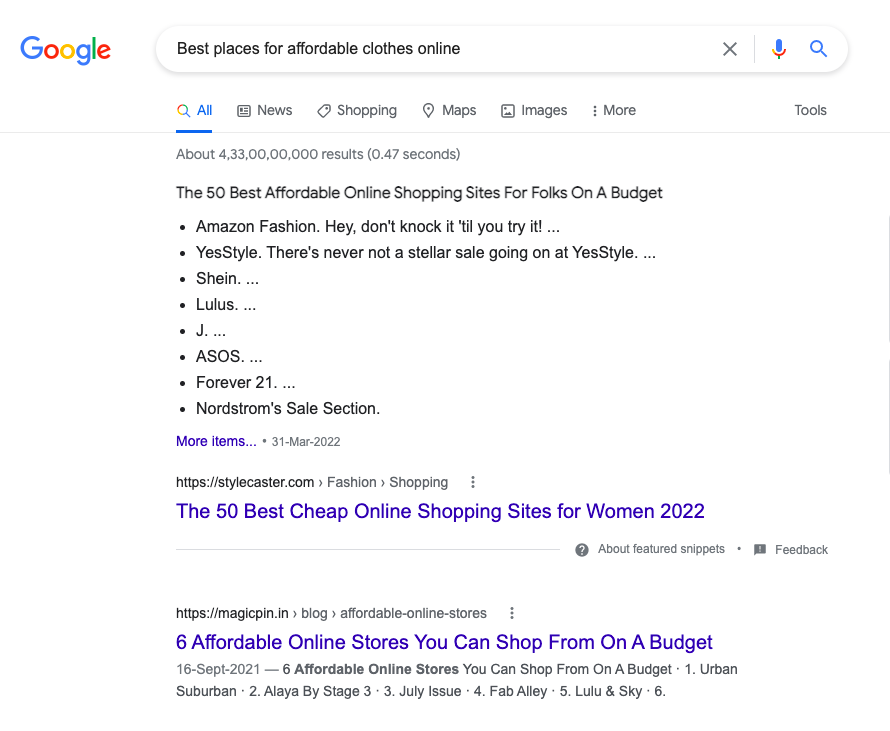
For example, if you sell clothes online, and if someone searches for “Best places for affordable clothes online” your online store is the second displayed result. There is a much higher chance of people clicking on that link to discover your store.
So how do you optimise your online store for SEO? You use relevant keywords.
But how do you choose these keywords? We’ll get to that.
First,
Contents
What are keywords and how do they help for SEO?
Well, keywords are phrases that people type in when they are looking for something on search engines.
Google matches the keywords in the search queries to the keywords used on different website contents.
The websites that genuinely fulfil the searched keyword’s intent, or exactly match the phrase, usually show up higher on SERP.
So, if your online store can convince Google (or any other search engine) that you are the best option that can help satisfy a searcher’s needs, your eCommerce website will definitely rank higher on SERP. And as we said before-
Ranking higher = More discovery = More traffic = More sales!
Want to learn more on how to use keywords effectively for your online store? Download our free eBook for the full guide!
How do I use keywords to improve online store SEO?
You need to understand what keywords to target. Once you know what words or phrases your customers are most likely to use, you need to then design and plan your content in such a way that these phrases are genuinely used on your eCommerce website.
Some places that you definitely should be using keywords on your online store:
- Product descriptions
- Page titles
- Homepage
- About page
- Page categories
- Meta titles & Meta descriptions
Did you know the premium online stores on Instamojo are optimised for SEO? You can easily add relevant meta titles and descriptions for your store to increase your chances of discovery!
See this video to know how to improve SEO for your Instamojo online store –
How to do keyword research for beginners
Now that you have a thorough understanding of what exactly are keywords and why you need them. The real question becomes –
How to do keyword research?
As someone who just started out in the world of eCommerce, you do not need to invest thousands of rupees to understand what keywords you should target. Here are some simple, easy to understand and most importantly FREE ways to do keyword research:
1. Understand your community and potential customers
Try to understand the problems or needs that your target audience has. And then try to see where you can solve their problems. Knowing how and what your customer is going to be asking is going to give you a sense of the keywords that your online store should’ve targetting.
“Optimising your store content and focussing on its quality can demonstrate authority and trustworthiness to search engines hence helping you rank higher on your preferred keywords.”- Senthil, VP of NPD India
For example, if your audience likes catchy slogans on their T-shirts, then you would probably not title a T-shirt you sell as “Elegant, luxurious cotton T-shirt”. If your audience is a marvel fan, then you would need to title your product pages as “Marvel Cotton T-shirts”
” When your friends give you reviews/feedback or the reviews you get on Facebook – they are in casual lingo. These give you genuine indications of why your product works and why it doesn’t. You can use this feedback to curate product descriptions that actually resonate with your audience.” – Senthil, VP of NPD India
Related read: How to Sell T-shirts Online: A Quick Guide
2. Use Google
Google is the most powerful search engine on earth. That means – before you even try third party software to do the keyword research for you, just try these simple hacks n the google homepage itself.
Let’s first use an example: You want to sell home decor online.
Try a simple search on Google. It will show you how many search results are there for that particular keyword.
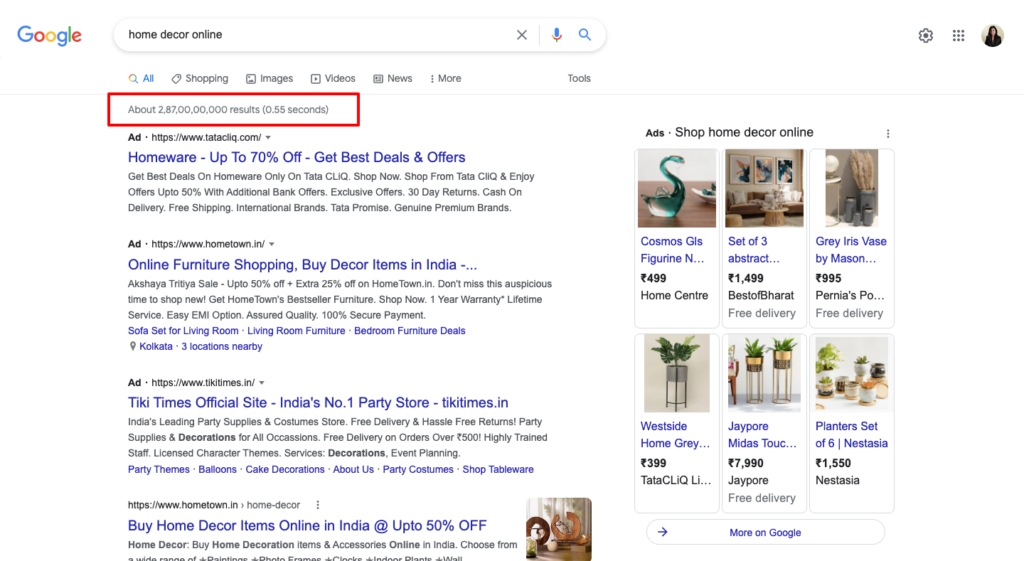
As you go on refining your keyword, you would see the change in search results. Target long-tail keywords to reduce your competition.
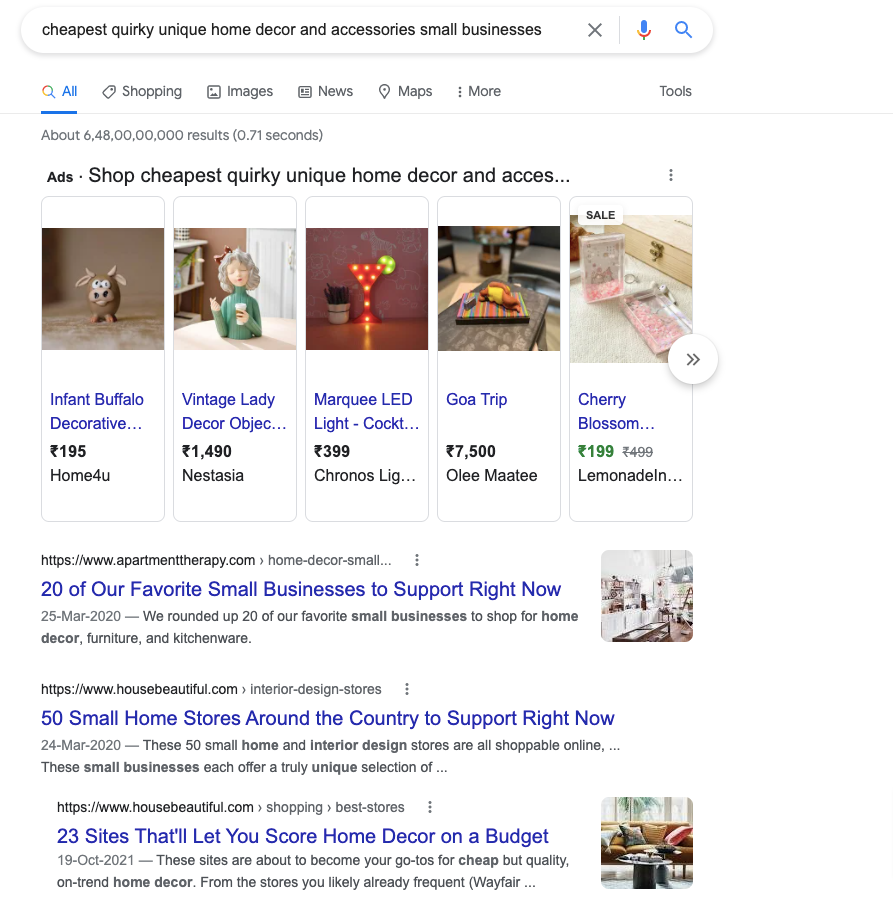
You can also check what Google Autosuggest is telling you. These are based on past browsing histories and can give you a better sense of what people usually search for.
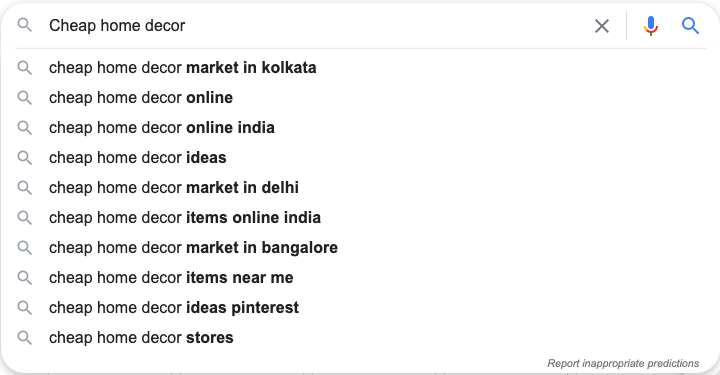
Lastly, check the People Also Ask sections. Similar to autosuggest, these are phrases that are frequently asked by customers and they can help you decide your keywords for your particular topic of interest.
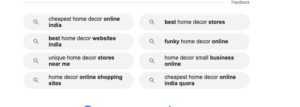
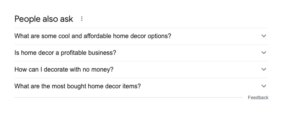
3 full-proof keyword strategies that help you improve content SEO
So now that you know what keywords you should be targetting, How do you optimise your website content accordingly?
Here are a few foolproof strategies suggested by Senthil Hariram to ensure your online store sees the best and most sustainable organic traffic you have ever seen!
1. Build a brand by increasing community-led traffic
When you have just created an online store, you cannot expect customers immediately. As a small business owner, your first steps should be to first grow community-led traffic. How do you do that?
- Offer your products to friends and family first
- Ask them to post genuine reviews
- If they like your product they would start referring your store to other people
- Build relationships. Offer freebies, tell them first about new launches and ask for advice
- Understand from the community what your product/online store needs to become better
“Building a community is a big part of building trust as a small business. It also extends to search engines. You can use your community to create content that point back to your website.”
2. Establish expertise through blogs, guides and tutorials
To gain Google’s trust, you have to establish expertise. If Google believes that the content you have on your website is true, genuine, relevant and useful, you have a higher chance of ranking at the top.
“Invest in content right from the beginning as a part of your marketing strategy. This will help you get long-term benefits. This can be core to your DTC brand strategy. Combined with community and a smooth website experience via instamojo, you can build a successful business.” Senthil, VP of NPD India
How do you establish credibility and expertise through content?
The best way to do that is to create content about the field you are in. Writing blogs, guides and tutorials on different topics related to the industry you are in can help in asserting your authority on the subject.
For example, if you sell jewellery online, you can write content that talks about how to take care of jewellery, what material suits what accessories, marketing strategies for jewellery, etc.
You can also try these methods to show yourself as an expert:
- Partner with micro-influencers on relevant content and keywords
- Create Youtube videos that give detailed insight on the topic
- Guest blog for other platforms using similar keywords
- Consistently post on social media with links to your content, so that more people can discover/share your content
The more people engage with your content, Google can then track the keywords that you are using and hence will start considering them as credible and genuine.
3. Build backlinks with other reputed websites/brands
Backlinks or “inbound links” are when other websites link your website to content on their own website. When credible websites with high organic traffic give links to your online store or website, Google sees that as “Oh, if this website trusts them, so should I”.
However, do remember – Always try for quality backlinks. Try to build as many backlinks as possible with good websites that have high domain authority. The more backlinks you have, the higher your website will rank on SERP.
You should also ensure that the words they use to link to your website(also known as anchor text), are your target keywords.
TLDR: Watch this webinar to know how to use keywords to improve SEO in detail
“Well-designed product pages, about pages, FAQ pages, and a blog can help you win the long term SEO game while you build your brand.”- Senthil, Vice President of Neil Patel Digital India
Want an SEO optimised online store to sell what you want, how you want without any hassles? Get started with Instamojo.


